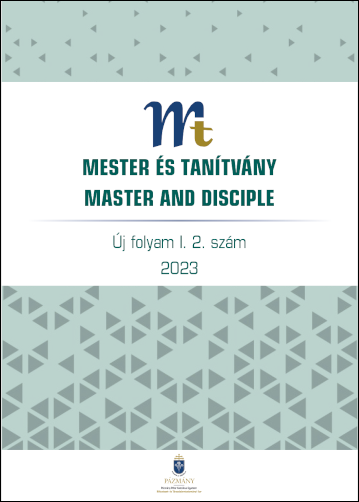Discourse analysis: an opportunity to examine teachers’ personal interpretation of their professional identity: The findings of a research conducted in a high school in Budapest
Published 31-12-2023
Keywords
- discourse analysis,
- role of teachers,
- conceptual meaning of school,
- professional identity
Copyright (c) 2023 Polyák-Pásztor Diána

This work is licensed under a Creative Commons Attribution 4.0 International License.
Abstract
Nowadays, it seems necessary to examine how our conceptualization of knowledge, schools, and the role of teachers has transformed. Beginner teacher’s personal role interpretations are influenced by several factors, e. g. primary socialization, social discourse and first teaching experiences. The tradition of discourse analysis related to Bakhtin and Fairclough can provide information about the functions that teachers link to their profession, because it is corpus-based and focuses on the personal discourse. This theoretical framework is also capable of pointing out whether a given function is a central or a peripheral element of someone’s professional identity. This paper presents the findings of a research conducted among teacher candidates and beginner teachers of a high school in Budapest regarding the functions fulfilled by teachers in the 21st century. The paper distinguishes the twelve following functions: forming attitude, transfering practical knowledge, transfering declarative knowledge, preparing for state-level exams, ensuring curricular progress, developing personality, creating an atmosphere, promoting moral development, forming a teacher’s own identity, being a person of authority, having excessive focus on meeting the needs of others. The research shows that some functions are the internal expectation of the informants, while others are considered to be expectations of their environment. The paper discusses the informants’ positive or negative attitude towards the functions if it is supported by linguistic data. The aims of the study are to identify the emphasized roles, and detecting some tendencies and changes related to the approach of the educational professions behind the informants’ personal preferencies.
References
- Ahearn, L. M. (2001). Language and Agency. Annual Review of Anthropology, 30(1), 109–137. https://doi.org/10.1146/annurev.anthro.30.1.109
- Bahtyin, M. M. (1981). The Dialogic Imagination. Austin, London, University of Texas Press.
- Fairclough, N. (2003). Analysing Discourse: Textual Analysis for Social Research. Abingdon, Routledge.
- Foucault, M. (1982). El sujeto y el poder. Revista Mexicana de Sociología, 50(3), 3–20. https://doi.org/10.2307/3540551
- Huszár, Zs. (2001). Tanárjelöltek pedagógusszerep-felfogása. Acta paedagogica, 1(2), 16–20.
- Nahalka, I., Kotschy, B., Lénárd, S., Szivák, J. & Golnhofer, E. (1997). A pedagógusok gyakorlati, mesterségbeli tudása (Egy felmérés tanulságai). Iskolakultúra, 9(9), 36–75.
- Sallay, H. (1995). Tanári szerepek percepciója: egy általános iskolai felmérés tanulságai. Magyar Pedagógia, 95(3–4), 201–227.
- Burns, T. R. & Carson, M. (2005). Social order and disorder (Institutions, policy paradigms and discourses: An interdisciplinary approach). In Wodak, R. & Chilton, P. A. (2005), A new agenda in (critical) discourse analysis: theory, methodology and interdisciplinary (283-309). Amsterdam, Benjamins. https://doi.org/10.1075/dapsac.13.18bur

